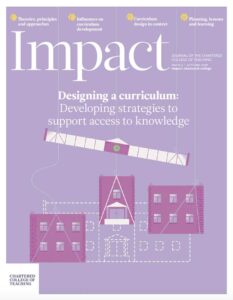Skills versus knowledge: A curriculum debate that matters – and one which we need to reject

Public debate across the West is often polarised, angry and hysterical. Social media amplifies extreme and strident views. People tend to think the worst of their opponents and often believe or disbelieve things because it suits their preconceived ideas…’
This is the introduction to the BBC radio series Sweet Reason. Unfortunately, this description is all too true of debate over the content of the curriculum – particularly the trenchant debate over ‘skills versus knowledge’. Recently I contributed to a review of a nation’s experimental curriculum, and in the report I referred to the heated debate between knowledge and skills, concepts and contexts. A reviewer challenged the existence of the debate, stimulating me to go back through the literature, press stories and blogs to establish the locations of the arguments, the people involved and the nature of what they said.
This debate is not as evident in academic writing as might be expected. In journal articles, there is a clear tendency to examine and advocate ‘new skills’ or explore areas such as ‘multiple intelligence’ without situating these in a wider debate about the aims of the school curriculum. Articles land on either side of the debate without acknowledging that the debate is occurring. There are exceptions. Coincident with the work laying down the principles for the new National Curriculum, Michael Young’s work on the ‘return to subjects’ (Young, 2011) and ‘powerful knowledge’ (Yong, 2013) opened an explicit discussion of the attitudes to knowledge that have been dominant in education in England.
Is it a debate that matters? Absolutely. Views of ‘what should be taught’ determine the actions and engagement of teachers and students as well as the overall shape of the school timetable. Unnecessary change to the National Curriculum rips capacity from the education system as teachers spend time grappling with new requirements. Talk of ‘constantly changing human knowledge’ fails to recognise that fundamental paradigm shifts appear very infrequently in disciplines. Tectonic plate theory in geography was the last fundamental change there – in the 1960s – combined with a little more emphasis on human geography and greater exploration of well-established principles of climate science. The application of genetics may be changing clinical practice daily, but the fundamentals were laid down by Mendel – in 1863 – and the structure of DNA explored by Crick, Watson, Franklin and Wilkins in the 1950s. In a curriculum that is pushed for space, fundamentals count.
My paper ‘Could do Better’ (Oates, 2010) outlined the vital distinction between ‘concepts’ and ‘contexts’. If a National Curriculum focuses on contexts and application, rather than fundamental concepts, it will be destined for constant change. And there lies a big tension. With limited time and space in the curriculum, choices necessarily need to be made. There are areas of the curriculum that are relatively arbitrary – the plays of Shakespeare: which ones? The history of the economic and social development of South East Asia or of South America? Such arbitrary choices can always be contested. But in some instances the discussion has morphed from ‘which elements of subject disciplines’ and ‘which authors’ into an idea that every aspect of knowledge is arbitrary.
The unprecedented growth of human knowledge has led some commentators to argue that a focus on carefully selected ‘core knowledge’ is irrelevant, and the ‘skills’ associated with ‘finding knowledge’ are the true focus of education. This position entirely fails to engage with established theory in psychology – that persistent schemas are needed in the minds of individuals to identify and organise knowledge, and that the knowledge held by an individual is determining of identity (who they are) and competence (what they can do). Helen Abadzi’s work (Abadzi, 2008), for example, shows how higher order thinking is dependent on the utilisation of cognitive resources that have been located in long-term memory – concepts, principles, ‘core knowledge’.
This argument is not an argument ‘for’ knowledge and ‘against’ skills. It is an argument that says that to oppose the two is quite wrong. In public debate about the curriculum, we have to move on from;
- ‘knowledge versus skills’
- ‘learning inputs versus outcomes’
- ‘theory versus application’
These have been presented as gross polarities, with the three on the left-hand side (knowledge, learning, theory) being seen as ‘traditional and outmoded’ and the three on the right (skills, outcomes, application) as ‘progressive and modern’. However, such oppositional discourse fails to reflect the most effective pedagogy from around the world. But what about places like Scotland and Estonia, both of which are hailed as beacons of ‘outcomes-based curricula’? Debate in Scotland is full of legitimate concern over declining standards and the confusions emanating from a curriculum that emphasises complex experience and application over clear focus on core constructs. I am not saying that rich, engaging experiences should not be there for all pupils. But you need to get these in the right place.
The National Curriculum in England laid down the key distinction between the National Curriculum – a parsimonious statement of essential content – and the school curriculum – a set of rich and engaging experiences, determined by teachers and focused on all children acquiring essential content. And is the 2014 National Curriculum ‘only knowledge’? Not at all. The general goods of education – confident, creative, thoughtful children – are just as strongly emphasised as the acquisition of powerful knowledge – and they are not opposed, but connected. Interestingly, that’s why Estonia – putatively ‘competence-based’ – is almost completely aligned with England. There, they too maintain the distinction between the national curriculum and the school curriculum. There, the aims statements also emphasise application, analysis, creativity and engagement. But the statements of content, just as in England, assert the importance of the memorisation of times tables, the fundamentals of grammar, and historical facts. They too see the importance of the foundations of critical thinking for higher attainment and better equity. So, let’s move beyond disruptive, casual comment and get on with the task of improving education for all.










